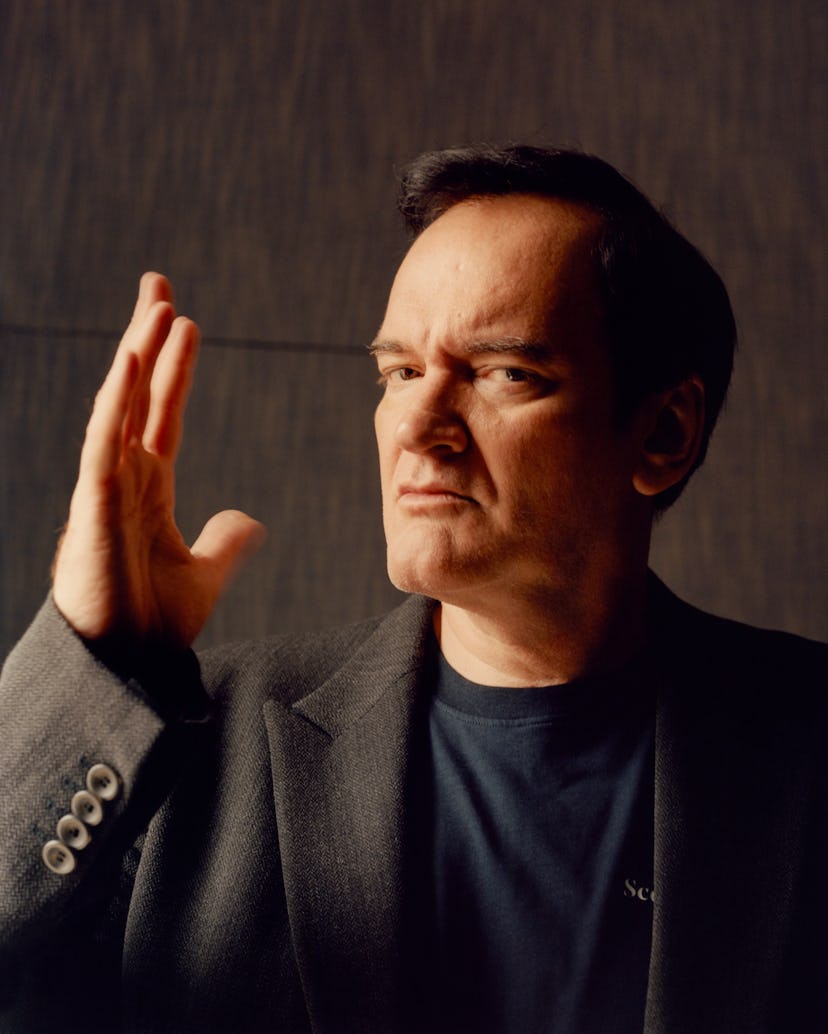For our annual “The Originals” issue, we asked creatives—pioneers in the fields of art, design, fashion, comedy, film, activism, and more—to share their insights on staying true to themselves.
Your new novel, Once Upon a Time in Hollywood, is based on your film of the same name. Did you start by writing the script for the film, or did the novel, which both echoes and vividly departs from the movie, come first?
I wrote an opening chapter for Once Upon a Time in Hollywood called “The Man Who Would Be McQueen,” 14 years ago during my press tour in London for Death Proof. It was a history of Rick Dalton’s career. [Dalton, a fictional TV actor from the ’60s, would eventually be played by Leonardo DiCaprio in Tarantino’s film.] That was my favorite thing I’d ever written. Then I was like, Okay, who am I fucking kidding? I’m going to make this into a movie just so I can shoot the movies that Rick Dalton did! So I can shoot those clips and make those posters and do all those marquees. I then spent two years trying to figure out how to turn my little cinema book chapter into the movie.
You won a Golden Globe for the script, and the movie was nominated for 10 Academy Awards, including Best Picture. What made you go back to the novel?
The script was the outline, but it was one of those things where I had a ton of material. I wanted to learn about the Hollywood of the ’60s. I just wrote, wrote, wrote. There was also the idea that the book is the book and the movie is the movie, and I want the book to work like a novel and do the things a novel can do.
You consistently play with reality. For instance, did Sharon Tate really snore?
I don’t know! That was a character touch of my own—the idea that this sleeping beauty had a snoring problem. I thought that was a charming thing.
Was her dog really named Dr. Sapirstein after one of the devil worshippers in Rosemary’s Baby?
Yes, that was the name of the dog. That’s in her husband, Roman Polanski’s, autobiography. My greatest hope is actually that you cannot tell where the real stuff starts and the alternative history begins. That it’s all a jumble.
I’ve always felt that one of your talents was in naming things, like Bounty Law, Rick Dalton’s TV show in the novel and the film.
It’s a very dark show, darker than they probably would have allowed in 1959, when it supposedly aired. I think I specialize in coming up with names. My reason to write is almost to name towns, bars, restaurants, and the movies my characters are watching. When you see movies about Hollywood, the fake titles often sound fraudulent. The Pickle That Ate Pittsburgh or something like that. Even when my titles are strange, like The Fourteen Fists of McCluskey, that does sound like a World War II bunch of guys on a mission movie, circa 1966. When my friend read the script, he said, “This is pretty good, but what I want to see is The Fourteen Fists of McCluskey!”
Unlike the film, the novel has sex scenes. Were they fun to write?
Yes. I’m not interested in shooting naked people in a movie. I don’t want to have to convince actors to do things they might be uncomfortable with. I mean, look, if it were 1971, I’d probably feel differently about it. But ever since I’ve been making movies, it’s been an uptight issue. But with a book, I’m not degrading anyone; they’re just figments of my imagination.
What are your favorite films of the late ’60s, when Once Upon a Time in Hollywood is set?
Head, starring the Monkees—the script is cowritten by Jack Nicholson! And Yellow Submarine. I’m not a big Beatles fan; you’re either an Elvis man or a Beatles man, and I’m an Elvis man. But sometime in 1999, my then girlfriend and I watched Yellow Submarine, and we loved it. After seeing Yellow Submarine, there finally was one thing about the Beatles that I had tremendous affection for.
This article was originally published on
